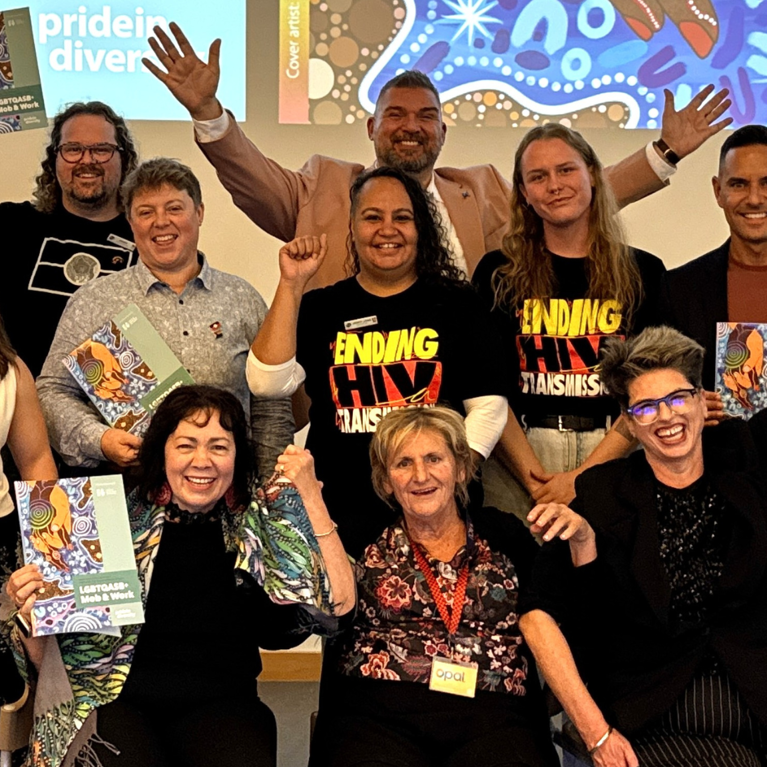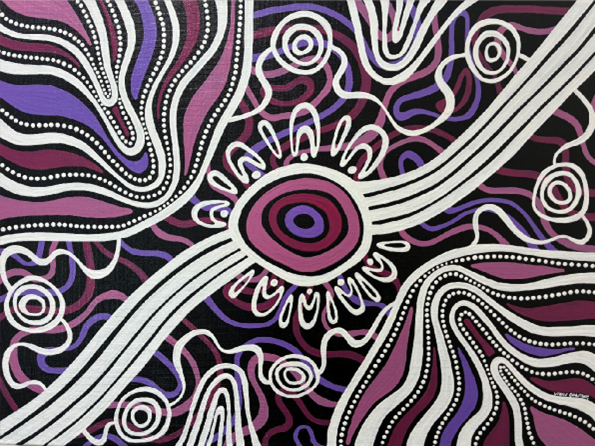- Posted on 10 Jun 2025
- 3-minute read
LGBTQASB+ Mob & Work – authored by UTS’s Alison Whittaker and Professor Nareen Young, and ACON's Pride Inclusion Programs – is a new report that highlights and provides potential solutions to the challenges facing First Nations LGBTQA+ people, sistergirls and brotherboys in the Australian workplace market.
Building this knowledge is critical. Access to safe and just workplaces contributes directly to how Indigenous LGBTQASB+ people survive and sustain themselves, their families and their communities. Access to knowledge means that the employment community can begin to consider these experiences and possible remedies.
The report was launched on Thursday 22 May at the UTS Business School and was sponsored by the UTS Centre for Social Justice & Inclusion and Woolworths Group.

Extract from Professor Nareen Young’s address at the launch event:
Two weeks ago, when we launched the Indigenous-led Centre for Indigenous People and Work, a joint venture between the Jumbunna Institute and the UTS Business School, we talked about reclaiming the Indigenous employment narrative.
Specifically, that means truth-telling as it pertains to both the past and moving forward. Specifically, that means the acknowledgement that during the taking of the land and ongoing, our people have always played a part in the development and maintenance of the modern economy. From Rowena Welsh-Jarrett’s research, we know that coastal women were trading with the colonists from the first days of the colony.
We know that our people have gone to extraordinary lengths to participate in the workforce, often having their wages stolen, often being paid in rations on their own land, often being stolen from their families to support the colonial project, often foregoing community and identity to participate, and often being indentured. But oh no, we didn’t have slavery in Australia.
So please stop the reductive, deficit language of ‘Indigenous employment’ and ‘Indigenous economic participation’. We know what our contribution is and has been, and we know that it’s not about political statements that say that we want to be shoved into low-skill, low pay jobs for a couple of months. That is not ‘Indigenous employment’.
For First Nations LGBTQA+ people, sistergirls and brotherboys, who, as the report states, and of course as this project indicates, have always, always been a valued and loved part of our community, I want to acknowledge their contribution to social justice, culture, social and family life which is undeniable and significant; the imposition of the ways of the coloniser have not been easy for Rainbow mob and no more is that displayed than in employment and labour market participation.
So, we wanted to track these experiences so that we can make recommendations, suggestions and contribute to the work discourse for Rainbow mob in a way that is Rainbow-mob lead and true to their experiences.
Since you’ve all discovered intersectionality, which to many of us is just who we are and the way we live and have always known, we have intersecting pieces around Rainbow Mob in the Centre for Indigenous People and Work’s Gari Yala survey, the only Indigenous-led survey of Indigenous people’s workplace experiences, and the wonderful Pride in Diversity Australian Workplace Equality Index Employee Survey. It is with great pride, pardon the pun, that I can say that with my friend Steve Clayton I am a co-founder of Pride in Diversity, and it is a great pleasure to see how you have grown and thrived.
But we needed a piece that recognises the unique, intersecting identities of Rainbow Mob, that addresses the longstanding discussions within our community about the safety of workplaces and the material living conditions of LGBTQASB+ mob, that utilises Indigenous research methodology, that was self-determined and recognises that only Rainbow Mob can speak for Rainbow Mob, despite me being here as an old straight lady.
The report contains recommendations for the employment community based on that data – to employers, to the HR and diversity industries and to unions. It is unique, incredibly valuable and recognises the valued role and place of Rainbow Mob in our First Nations and the broader community. I am very grateful to have had the opportunity to work on it, thank Rainbow Mob for giving it time and space, and I commend it to you.






